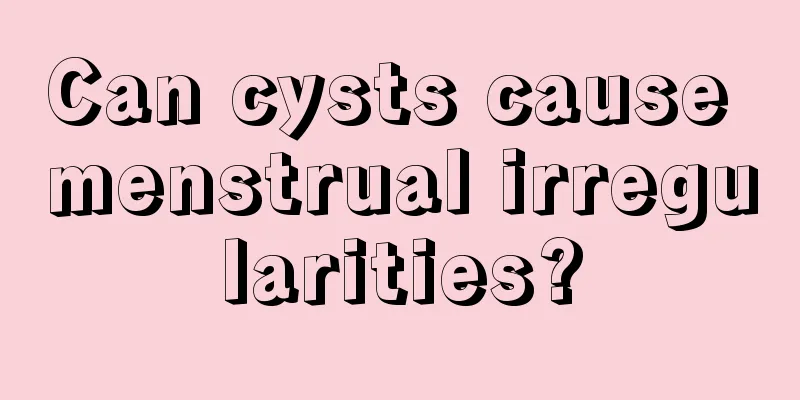Can cysts cause menstrual irregularities?

|
Ovarian cysts generally affect women's menstruation and can easily lead to irregular menstruation. If you want to treat ovarian cysts, you need to decide based on the size of the ovarian cyst. If the cyst is not particularly large, surgery is generally not required and you can take medication to regulate it. If the cyst is relatively large, it is best to have surgery in time, and regular check-ups must be done after the surgery. Can ovarian cysts cause menstrual irregularities? Generally, ovarian cysts, even bilateral ovarian cysts, do not cause menstrual disorders because they do not destroy all normal ovarian tissue. Some uterine bleeding is not endocrine, or it may be caused by ovarian cysts that change the pelvic blood vessel distribution, causing endometrial congestion and leading to menstrual disorders; menstrual disorders may also be caused by direct metastasis of ovarian malignant tumors to the endometrium. Menstrual disorders caused by endocrine tumors are often combined with other secretory influences. Common symptoms of ovarian cysts 1. Discomfort in the lower abdomen This is the initial symptom before the patient feels a lower abdominal mass. Due to the weight of the tumor itself and the influence of intestinal peristalsis and changes in body position, the cyst moves in the pelvic cavity, involving its pedicle and pelvic infundibulum ligament, causing the patient to have a feeling of fullness and falling in the lower abdomen or iliac fossa. 2. Increased abdominal circumference and abdominal tumors It is the most common phenomenon in patients with ovarian cysts. The patient realizes that his clothes or belt seem tight and small, and then notices that his abdomen is enlarged, or he feels it occasionally in the morning, so he presses his abdomen and finds a tumor in his abdomen, coupled with abdominal distension and discomfort. 3. Abdominal pain If the tumor has no complications, there is very little pain. Therefore, if patients with ovarian cysts feel abdominal pain, especially if it occurs suddenly, it is mostly due to torsion of the cyst pedicle, or occasionally due to cyst rupture, bleeding or infection. In addition, malignant cysts often cause abdominal pain and leg pain, and the pain often causes patients to seek emergency treatment. 4. Compression symptoms Huge ovarian cysts can cause dyspnea and palpitations due to compression of the diaphragm. Ovarian cysts combined with a large amount of ascites can also cause these symptoms. However, the dyspnea of some patients with ovarian tumors is caused by unilateral or bilateral pleural effusion, and is often combined with ascites, forming the so-called Meigs syndrome. A huge benign ovarian cyst fills the entire abdominal cavity, increasing the intra-abdominal pressure, affecting the venous return of the lower limbs, and can lead to edema of the abdominal wall and bilateral lower limbs; while a malignant ovarian cyst fixed in the pelvic cavity compresses the iliac vein, often causing edema of one side of the lower limb. The pelvic and abdominal organs are compressed, causing dysuria, urinary retention, urgency or difficulty in defecation. 5. Systemic symptoms If the tumor grows rapidly in a short period of time, and the patient has symptoms such as loss of appetite and weight loss, and the tumor is found to be large and uneven in hardness and softness, be careful that it may be a benign tumor that has worsened. Surgery should be performed as soon as possible, followed by drug treatment. |
<<: Irregular menstruation, dysmenorrhea and blood clots?
>>: Is it wind-induced itching in pregnant women’s hands and feet?
Recommend
I feel bad after giving birth and always want to cry
In addition to some physical conditions, some pre...
Staple food, are you eating it right?
Food is the most important thing for people, and ...
Is there a high chance of pregnancy with pelvic effusion?
The treatment for this type of problem depends on...
What are the taboos for pairing Arctic shrimp? How to defrost Arctic shrimp?
Arctic shrimp are widely distributed in the easte...
Why can camels eat prickly cacti? The growth process of cacti from small to large
Cactus, also known as fairy palm, overlord tree, ...
How harmful is it to eat dinner too late? I'm not trying to scare you...
This article was reviewed by: Pa Lizhe, chief phy...
What are the treatments for vaginitis in girls?
Vaginitis in girls is a relatively serious gyneco...
Can uterine fibroids turn into uterine cancer?
Can uterine fibroids become diseased? This is a q...
What is the best food for uterine cold?
For female friends with uterine cold, the most wo...
23 Seconds Mission | Tribute to every Chinese doctor
August 19, 2023 is "Chinese Doctors' Day...
Is it normal to have no period after 3 days?
In daily life, many women have too much or too li...
What causes itchy cervix?
Itching at the cervical opening is often diagnose...
What to do if you are infertile for the second time
Now the country advocates having a second child, ...
What should I eat less during my period to increase my menstrual flow?
Nowadays, many women have the problem of small me...
There are actually these reasons for acne on the nose and ways to eliminate acne
Acne on the nose is a problem that troubles many ...









